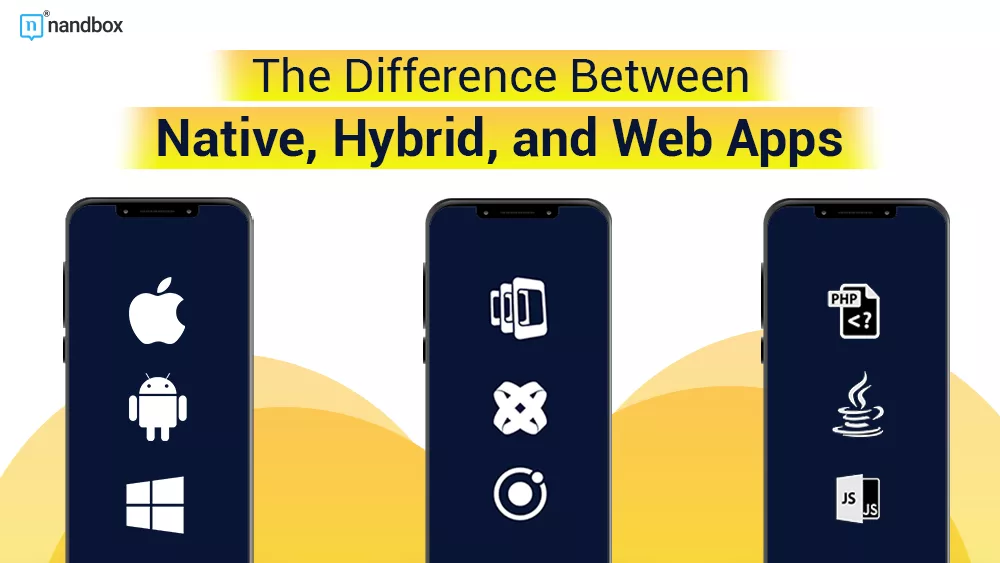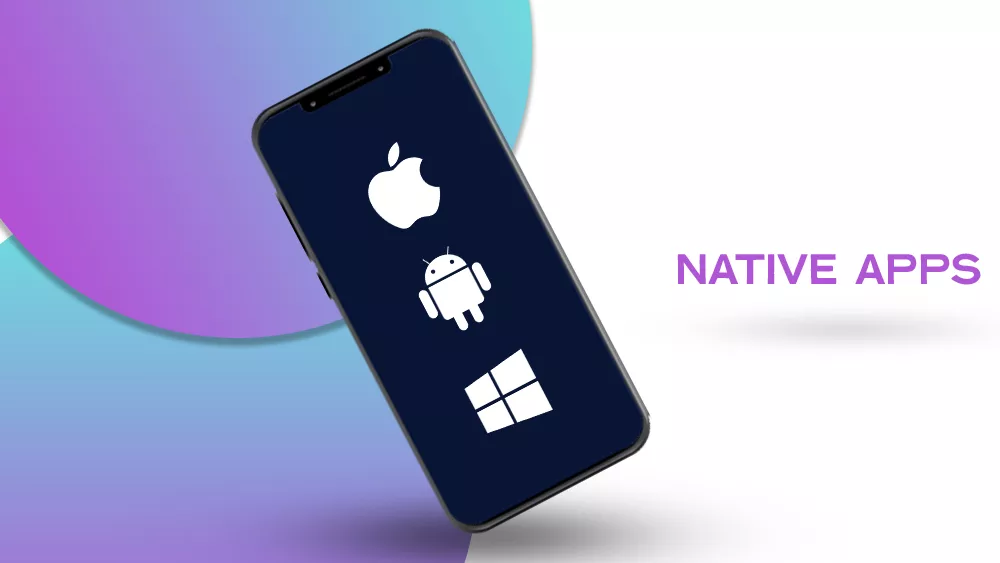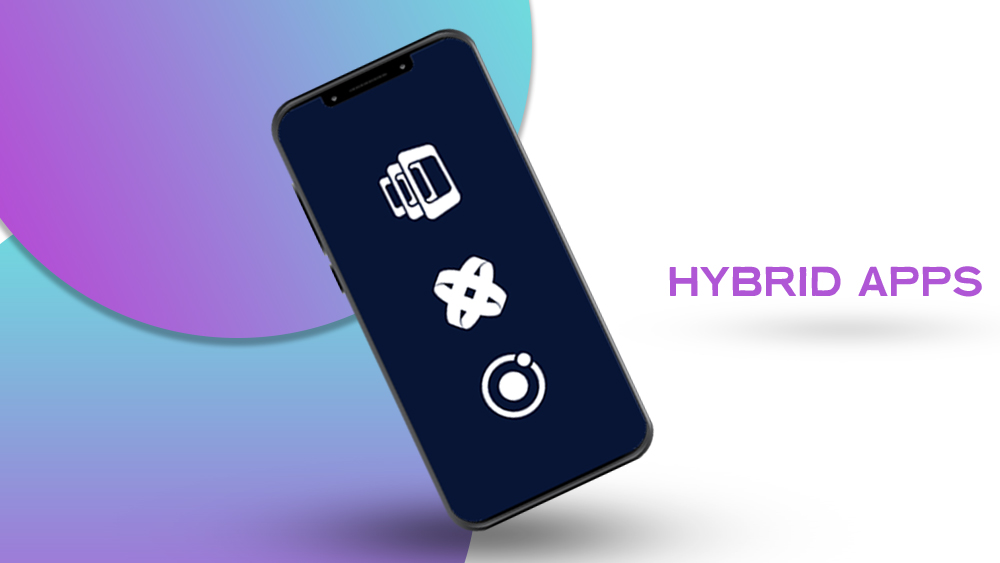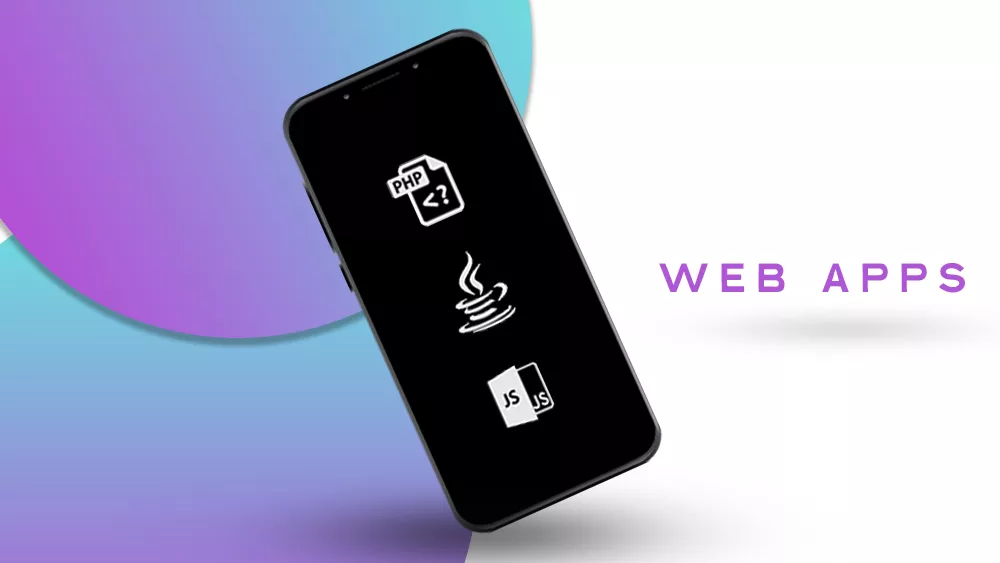You may think that your mobile app is an actual app, but it could be a web page disguised as an app. The difference between native, hybrid, and web apps will clear this point for you. Discover what sets them apart!
First of all, a mobile app is just a piece of software that is made to run on smartphones and tablets. This app lets people use their devices to get information, get things done, and talk to other people.
And by knowing your app’s type, you will be able to plan your business clearly according to the technical capabilities and limitations of your app.
The Difference Between Native, Hybrid, and Web Apps
Native App
Native apps are built specifically for each platform they run on. That means if you build an iPhone app, it will only work on iPhones. If you build an Android app, it will only run on Android devices, and so on.
Advantages
- The fastest mobile app type.
- Interact easily with device utilities.
- Present the best user experience.
- Built for specific platforms.
- The most common type of mobile app.
- Distributed mainly in app stores.
Disadvantages
- Hard to build and maintain for non-mobile developers.
- A custom version must be built for each store, Apple App Store, and Google Play Store.
- Very expensive and rare to hire a collective team.
But, guess what? nandbox app builder clears all of these disadvantages for you, and with nandbox app builder you select the feature, drag, drop, and click build. And that’s it, no coding experience required, no developing team required, and not costly at all compared to building through the traditional way.
Hybrid Mobile Apps
Hybrid mobile apps combine the power of native applications and web technologies into one package. This allows developers to create hybrid apps that work across all platforms without having to develop separate versions of the app for each platform. Which demands a high budget and a skilled team to create one app.
Advantages
- Combination of native and web apps.
- Ran inside of a container/webview.
- Single app for all platforms.
- Compiles basic native components.
Disadvantages
- Slower than native apps.
- Less interactive than native apps.
- Costs more money than native and web apps.
Web Apps/Mobile Websites
Web mobile apps are responsive websites that run inside a mobile browser window on a smartphone or tablet device. These apps allow users to access information and perform tasks without having to download anything onto their phone or tablet.
Advantages
- Built using common coding languages CSS/JavaScript/ HTML5.
- Cheaper than native apps and hybrid apps.
- Single app for all platforms.
- Faster to build.
Disadvantages
- Need to run in a browser like Chrome, Edge, etc.
- Less interactive and less intuitive.
- Slower than native apps and hybrid apps.
- The majority of users do not allow it to use the device utilities.
- Hard to be distributed in app stores.
Summary of The Difference Between Native apps, Hybrid apps, and Web Apps: Ice-Breaker Questions
From a technical perspective, the difference between a native, hybrid, and web apps might need a full book of coding computations, but mainly the difference between a native, hybrid, and web apps relies on this:
A native app runs directly on the device without any kind of web browser involvement. It uses the operating system’s APIs to access hardware features like sensors, cameras, etc.
A hybrid app runs on both the desktop web browser and the mobile device. It uses HTML5 to access the same hardware features as a native app but also uses JavaScript to provide additional functionality which makes it slower than native. In addition, by efficiently managing the event loop in JavaScript, developers can mitigate the potential performance drawbacks of hybrid apps caused by the additional functionality provided by JavaScript and ensure smooth and responsive user experiences on both desktop web browsers and mobile devices.
Finally, a web app runs entirely within the browser. It doesn’t use any native components. So, it’s only provides basic functionality and it’s the slowest app type.
The decision to improve your app and your whole business depends on identifying the best app type for your business, which must be based on many factors. So, let’s discover more with these eight ice-breaker questions, to go in-depth into this stage of decision-making.
How Easily Do You Want Your Platform to Be?
Deciding the level of complexity is related to your industry’s requirements. But if you want it to be easy to use, then building your platform as a native app is the right choice for you.
Are You A Solopreneur? Or You Are A Part Of A Team?
In both cases, building an app is very simple with our app builder, where you will not need to code anything, plus our support team will always be available to help you whenever you need it.
What Is Your Budget Limit?
Knowing your resources will shape your actions, and the budget factor is a critical difference between native, hybrid, and web apps. Remember, nandbox offers many pricing packages to fit your business’s budget.
What Level of Interactivity Do You Want for Your Platform?
If you decide to have an interactive platform. So, you should think about building an app because mobile applications are way easier to use from the customers’ perspective.
Are There Any Competitors? What Do They Use to Reach Their Clients?
Having competitors is a good sign because this refers to the profitability of the type of business, so studying them and the technologies they use will help you at least know what is required to join the market.
Do You Plan to Let Clients Customize Their User Experience?
This point is very important because it’s the style of the product you present to your targeted market, and using an app will give you the ability to offer what you have in the way you want.
How Many Monetization Methods Will Be Used?
Thinking about your revenue channels is critical to covering business expenses and creating a suitable profit margin. It’s common to have more than one method to make money from your platform, and here are some types of monetization you can use; selling digital products, renting virtual ad spaces, affiliate marketing, and sponsorships.
What Is Your Targeted Segment?
By knowing your targeted audience and understanding the difference between native, hybrid, and web apps. You will identify the best technology to use. Because it’s all about being in front of your ideal customer for as long as you can.
Why Should You Create a Mobile App for Your Business?
It gives you the ability to deal with your potential clients easily. They won’t need to Google you or type your name into any browser as long as they have your app. Also, It allows you to use all the mobile features, like push notifications, the camera, the microphone, the location indicator, and so on.
All of this will help you to have a better understanding and fulfill the needs of your clients. You can build your mobile application for a specific private community, like a specific company or club, or share it in public for everybody.
It opens your business to new sub-opportunities like renting ad spaces, recommending products, and collecting profits from affiliate marketing advertisers when you sell your digital products. There are no limits here.
Native mobile apps are way faster than web apps and desktop websites. It’s your business asset that will be used under your rules. For reaching more clients and closing more sales, you should create a mobile app.
How Challenging Is It to Make an App?
Using a no-code app builder makes the technical process very easy, it might take minutes or just a couple of hours. Just identify your idea, sign up for nandbox app builder and start creating your own app. After you finish, you can publish it to any app marketplace, and nandbox will help you with that.
The difficulties of app development are the results of passion and responsibility:
Restlessly improving the quality of the offered products and non-stop advertising efforts to have more downloads equal more clients, which leads to more revenue. Also, handling the monthly expenses until the app starts gaining momentum, and continuously adapting to market updates and needs.
But, for almost all entrepreneurs, these points are the most interesting and challenging aspects of any entrepreneurial business.
Finally, What Are the Biggest Advantages of Creating an App?
As a matter of fact, you will not have any success limits and will be able to grow your revenue endlessly. And here we will list the top five advantages.
1. Easy Accessibility
Mobile apps allow users to access information at any time and anywhere. Users can use their mobile devices to open a bank account, pay bills, and even make purchases. Apps are also great tools for businesses that want to reach customers where they spend their time.
2. Customizable
With mobile apps, companies can create unique experiences for their customers. Customers can customize their experience based on what they need. For example, if a customer wants to buy a product online, they can choose whether they want to view images of the product before purchasing it.
3. Targeted Marketing
Companies can target specific groups of people using mobile apps. By sending messages and offering customized solutions to individuals based on their location, age, gender, interests, and other factors.
4. Real-Time Data Collection
Mobile apps collect data in real time. This means that companies can get feedback from customers immediately after they complete a transaction. If a company doesn’t receive feedback, it may not know how well its product is selling.
5. Brand Loyalty
When consumers download an app, they most likely use this app’s products and services to easily reach your company’s products and services without any effort. And if they liked what you offer, they will recommend your app to others.
Conclusion
In conclusion, all it takes to have a great app business is to plan and be prepared to work hard for it. So, if you decided to build an app, nandbox app builder is here for you.
Whatever the decision you make after learning about the differences between native, hybrid, and web apps, nandbox app builder will simplify your whole building process. Try nandbox now.






